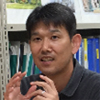Analysis of the difference in radiation tolerability among organs; toward the development of strategies against space radiation – Publicly Invited Research 2018-2019
- A01 Ogura
- A01 H. Takahashi
- A01 S. Takahashi
- A01 Michiue
- A01 Hinoi
- A01 Tsumoto
- A01 Nikawa
- A01 Chatani
- A01 Kawakami
- A01 Akiyama
- A01 Tomita
| Research Subject | Analysis of the difference in radiation tolerability among organs; toward the development of strategies against space radiation |
|---|---|
| Research Group Leader |
 Professor, Radiation Biology Center, Graduate School of Biostudies, Kyoto University Website http://www.rbc.kyoto-u.ac.jp/cancer_biology/ (*Written in Japanese) |
| Research Collaborator(s) |
|
Several lines of research have reported that radiosensitivity of cells is different among organs; the notion is based on the so-called Bergonie-Tribondeau's law. However, it remains largely unclear how and why the efficiencies of both generation and repair of DNA damage are influenced by tissue microenvironments. In our project, we aim at analyzing the diversity of the radiation-induced DNA damage responses among major organs by the use of genetically-engineered mice which enable us to monitor DNA double-strand breaks in real-time. In addition, we aim to identify novel gene networks responsible for the diversity. An ultimate goal of our project is to comprehensively understand the impact of space radiation on our body for the development of strategies to overcome space radiation.

